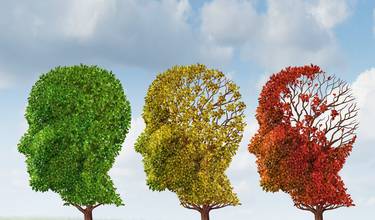What is dementia?
Dementia is a general term for a decline in mental ability severe enough to interfere with daily life. Memory loss is one example of this decline in mental ability.
Dementia is not a specific disease, but a term used to describe a variety of symptoms associated with a decline in mental ability, e.g. memory. The most common type of dementia is Alzheimer’s disease, which causes 60-80% of all cases of dementia. The second-most common type of dementia is vascular dementia, which often occurs after a stroke.
What are the symptoms of dementia?
The symptoms of dementia are extensive and they vary greatly from person to person. To be considered dementia, at least two of the following core mental functions must be significantly impaired:
- Memory
- Communication and language
- Ability to focus and pay attention
- Reasoning and judgment
- Visual perception
Many patients with dementia experience problems with short-term memory, and tasks like paying bills, planning and preparing meals, remembering appointments and traveling out of the neighbourhood are difficult.
Several types of dementia are progressive, which means that symptoms start out slowly and gradually worsen, until the mental abilities are severely affected.
What are the causes of dementia?
Dementia is caused by damage to brain cells. This damage of the brain affects the brain cells’ ability to communicate with each other, and this reduced communication between the brain cells affects a person’s memory, behaviour and feelings.
The brain consists of several regions, each of which is responsible for different functions, e.g. memory or movement. When the cells in a specific region of the brain are damaged, that region can no longer carry out its function normally.
The different types of dementia are therefore associated with particular types of brain cell damage in specific parts of the brain. In Alzheimer’s disease, high levels of protein on the surface and inside the brain cells affect the cell’s ability to communicate and function properly. The hippocampus, which is the area of the brain responsible for learning and memory, is often affected in people suffering from Alzheimer’s disease. Because of this, memory loss is often one of the first symptoms of the disease.
Dementia risk factors and prevention
Some of the risk factors for dementia, like age and genetics, cannot be changed. Researchers however try to uncover the impact of other risk factors on brain health and prevention of dementia. Some of the most active areas of research in risk reduction and prevention include cardiovascular factors, physical fitness, and diet.
- Cardiovascular risk factors: The brain receives oxygen and blood from one of the body's richest networks of blood vessels. Anything that damages the blood vessels anywhere in your body can damage blood vessels in your brain, thereby depriving brain cells of vital nutrition and oxygen. Blood vessel changes in the brain are linked to vascular dementia, and these changes are often present along with changes caused by other types of dementia, including Alzheimer's disease. These changes may interact to cause faster decline or make impairments of mental abilities more severe. By avoiding the common risk factors for cardiovascular diseases like smoking, high cholesterol and overweight, the risk of developing cardiovascular disease and thus of developing vascular dementia is lowered.
- Physical exercise: Regular physical exercise may help lower the risk of some types of dementia. Research suggests that exercise may directly benefit brain cells by increasing blood and oxygen flow to the brain.
- Diet: What you eat may have the greatest impact on brain health through its effect on heart health. Current evidence suggests that a heart-healthy diet, such as the Mediterranean diet, may also help protect the brain. A Mediterranean diet includes relatively little red meat and emphasizes whole grains, fruits and vegetables, fish and shellfish, and nuts, olive oil and other healthy fats.
What are the treatments for dementia?
Currently, there are no treatments for dementia. However, certain medications can slow down the progression of the disease temporarily. Some medications have side-effects that are similar to some dementia symptoms. In that case, your doctor will reassess your medical treatment and find other medications without these side-effects.
Today, there are drug treatments which reduce the symptoms of dementia. Four of the most common drugs against dementia include donezepil, rivastigmine, galantimine and memantine. The first three types reduce the symptoms in 50 % of patients with mild to moderate dementia. Memantine has a different effect, and it is typically used in more severe cases of Alzheimer’s. In most patients, symptoms will reappear after 1-3 years of treatment. Some psychological symptoms like depression, anxiety and delusions might require supplementary treatment with other medications.


